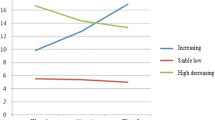Abstract
Background
The strengths and difficulties questionnaire (SDQ) is a brief screening instrument that addresses negative and positive behavioural attributes of children and adolescents in the age range of 4–16 years and can be completed by parents, teachers, and as a self-report. Furthermore, the impact supplement of the extended SDQ surveys for perceived problems, impact, and burden.
Objective
This paper aims to examine the psychometric properties of the parent form and to investigate differences in the SDQ scores for sociodemographic and socioeconomic subgroups. Patterns of association with other measures of mental health and descriptive comparison with the first normative sample are also reported.
Methods
Within the BELLA study module of the German Health Interview and Examination Survey for Children and Adolescents (KiGGS), a total of 2,406 children and adolescents aged 7–16 years as well as their parents answered the items of the SDQ and the additional impact supplement. The internal consistency of scale responses was assessed via Cronbach’s α (alpha). Likert scale assumptions of sufficient and similar item-total correlation and item variance were investigated. The factorial validity of the SDQ measurement model was tested by means of exploratory and confirmatory factor analysis. Mean score differences between males and females, age groups (7–10 years vs. 11–16 years), and socioeconomic status groups (Winkler index) were examined via ANOVA.
Results
Factor analysis provided an exact replication of the original five-factor SDQ subscale structure. All subscales were sufficiently homogeneous. The mean total difficulties and SDQ subscale scores of the BELLA sample did not differ from the first German normative data. Younger children were more impaired on various SDQ scales than older children, girls were more emotionally affected, and boys showed more externalising problems.
Conclusions
The present study confirmed the validity and reliability of the parent-reported SDQ scale structure. The SDQ was found to be a valid and helpful questionnaire for use in the framework of an epidemiological survey.
Similar content being viewed by others
References
Achenbach T, Becker A, Döpfner M, Heiervang E, Roessner V, Steinhausen HC, Rothenberger A (2008) Multicultural assessment of child and adolescent psycho-pathology with ASEBA and SDQ instruments: research findings, applications, and future directions. J Child Psychol Psychiatry 49(3):251–275
Barkmann C, Schulte-Markwort M (2004) Prävalenz psychischer Auffälligkeit bei Kindern und Jugendlichen in Deutschland - ein systematischer Literaturüberblick. Psychiatr Prax 31:278–287
Becker A, Woerner W, Hasselhorn M, Banaschewski T, Rothenberger A (2004) Validation of the parent and teacher SDQ in a clinical sample. Eur Child Adolesc Psychiatry 13(Suppl 2):11–16
Becker A, Steinhausen H-C, Baldursson G, Dalsgaard S, Lorenzo MJ, Ralston SJ, Döpfner M, Rothenberger A, ADORE Study Group (2006) Psychopathological screening of children with ADHD: Strengths and Difficulties Questionnaire in a pan-European study. Eur Child Adolesc Psychiatry 15(Suppl 1):56–62
Bettge S, Ravens-Sieberer U, Wietzker A, Hölling H (2002) Ein Methodenvergleich der Child Behavior Checklist und des Strengths and Difficulties Questionnaire. Gesundheitswesen 64:119–124
Buitelaar J, Rothenberger A (2004) Foreword–ADHD in the political and scientific context. European Child and Adolescent Psychiatry 13(1):1–6
Goodman R (1997) The strengths and difficulties questionnaire: a research note. J Child Psychol Psychiatry 38:581–586
Hill P (2005) Mental health promotion, prevention, and early intervention in childhood and adolescence. In: Williams R, Kerfooot M (eds) Child and adolescent mental health services. Strategy, planning, delivery, and evaluation. Oxford University Press, Oxford
Hu L, Bentler PM (1999) Cutoff Criteria for Fit Indexes in Covariance Structure Analysis. Conventional Criteria Versus New Alternatives. Struct Equ Modeling 6:1–55
Ihle W, Esser G (2001) Epidemiologie psychischer Störungen im Kindes- und Jugendalter. Prävalenz, Verlauf, Komorbidität und Geschlechtsunterschiede. Psychologische Rundschau 53:159–169
Jöreskog KG, Sörbom D (eds) (2001) LISREL 8: Users’s Reference Guide. Scientific Software International, Inc., Lincolnwood
Jöreskog KG, Sörbom D (eds) (2002) PRELIS 2: Users’s Reference Guide. Scientific Software International, Inc., Lincolnwood
McDonald RP, Ho MHR (2002) Principals and practice in reporting structural equation analyses. Psychol Methods 7:64–82
Meltzer H, Gatward R, Goodman R (2000) Mental health of children and adolescents in Great Britain. Stationery Office, London
Nunnally JC, Bernstein I (1994) Psychometric Theory, 3rd edn. McGraw-Hill, New York
Ravens-Sieberer U, Kurth B-M, KiGGS study group, BELLA study group (2008) The mental health module (BELLA study) within the German Health Interview and Examination Survey of Children and Adolescents (KiGGS): Study design and methods. Eur Child Adolesc Psychiatry 17(Suppl1): 10–21
Winkler J, Stolzenberg H (1999) Der Sozialschichtindex im Bundes-Gesundheits-survey. Gesundheitswesen 61(Sonderheft 2):178–183
Woerner W, Becker A, Friedrich C, Klasen H, Goodman R, Rothenberger A (2002) Normierung und Evaluation der deutschen Elternversion des Strengths and Difficulties Questionnaire (SDQ): Ergebnisse einer repräsentativen Felderhebung. Z Kinder Jugendpsychiatr 30:105–112
Woerner W, Fleitlich-Bilyk B, Martinussen R, Fletcher J, Cucchiaro G, Dalgalarrondo P, Lui M, Tannock R (2004) The strengths and difficulties questionnaire overseas: evaluations and applications of the SDQ beyond Europe. Eur Child Adolesc Psychiatry 13(Suppl 2):47–54
Woerner W, Becker A, Rothenberger A (2004) Normative data and scale properties of the German parent SDQ. Eur Child Adolesc Psychiatry 13(Suppl 2):3–10
Conflict of interest
All authors declare no conflict of interest.
Author information
Authors and Affiliations
Consortia
Corresponding author
Additional information
A. Rothenberger and A. Becker have contributed equally to the paper.
Members of the BELLA study group: Ulrike Ravens-Sieberer (Principal Investigator), Claus Barkmann, Susanne Bettge, Monika Bullinger, Manfred Döpfner, Michael Erhart, Beate Herpertz-Dahlmann, Heike Hölling, Franz Resch, Aribert Rothenberger, Michael Schulte-Markwort, Nora Wille, Hans-Ulrich Wittchen.
Rights and permissions
About this article
Cite this article
Rothenberger, A., Becker, A., Erhart, M. et al. Psychometric properties of the parent strengths and difficulties questionnaire in the general population of German children and adolescents: results of the BELLA study. Eur Child Adolesc Psychiatry 17 (Suppl 1), 99–105 (2008). https://doi.org/10.1007/s00787-008-1011-2
Published:
Issue Date:
DOI: https://doi.org/10.1007/s00787-008-1011-2




